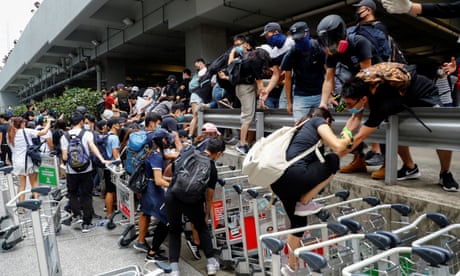Cantopop star says city has become a police state as young people fight for their lives
By Stephanie Convery
Hong Kong singer and activist Denise Ho at the Sydney Opera House for the Antidote festival.
“We are officially in a police state,” the Hong Kong Cantopop star and activist Denise Ho told a sold-out audience in Sydney on Sunday night.
Speaking at the Sydney Opera House’s Antidote festival, Ho told an audience of mostly self-identifying Hongkongers that the political upheaval in their home had reached “a point of no turning back”.
“We are in a state of humanitarian crisis where police have full authority to do whatever they want with the people, and the government is hiding behind the police force,” she said.
As protests in Hong Kong headed towards their 14th week, Ho reflected on the resilience and tenacity of the protesters, who have turned out in hundreds of thousands since the first demonstrations in June.
“Where does this courage come from? Hong Kong has never been known to be a politically conscious society,” she said.
“Nothing like this has ever been seen before and now people have been pushed to this edge – these young people are fighting for their lives and for their future.”
She rejected allegations by Beijing that the movement was being provoked by the US or other international players.
She rejected allegations by Beijing that the movement was being provoked by the US or other international players.
“This is a leaderless, centralised movement,” she said.
“They are still claiming there are foreign forces coming into the movement … it’s just not the truth.”
Before she was an activist, Ho was a singer.
Before she was an activist, Ho was a singer.
She launched her music career in the 1990s when she won a singing competition run by a Hong Kong TV station, but it wasn’t until the early 2000s that she broke through into the mainstream.
She began to identify publicly as a lesbian in 2012 – the first person in Cantopop to come out – and became an advocate for LGBT+ rights.
In 2014 she was arrested for taking part in the “umbrella movement” for universal suffrage in Hong Kong.
In 2014 she was arrested for taking part in the “umbrella movement” for universal suffrage in Hong Kong.
As a result she was blacklisted in mainland China, where she had a growing audience, and was dropped from major sponsorship deals and by her record label.
She responded by starting her own label, and by intensifying her political activism.
Despite being billed as a talk about pop and politics, Ho’s session at the annual ideas festival focused firmly on the latter.
In conversation with the journalist Zing Tsjeng, Ho touched on her singing career only insofar as it related to her activism.
Art and creative practice, she said, was a space in which “the fight can go on”.
Art and creative practice, she said, was a space in which “the fight can go on”.
“They can lock you up, they can ban you from going into the country, and they can censor your name on Chinese social media, but they cannot really control your mind.”
She said she believed most celebrities had been “silencing themselves” on the political situation in Hong Kong “for fear of being blacklisted, as I have been, on the China market”.
The audience gave no indication that they minded the singular focus of the event.
She said she believed most celebrities had been “silencing themselves” on the political situation in Hong Kong “for fear of being blacklisted, as I have been, on the China market”.
The audience gave no indication that they minded the singular focus of the event.
Crowd members chanted pro-freedom slogans.
Questions from the floor were focused mainly on protest strategy.
They wanted to know what they could do from Australia to help their families at home.
They called out in encouragement and support when the event took an emotional turn.
Ho was brought to tears as the audience was shown a short video summarising the months of protests, which were triggered in June by the introduction of a bill that would have allowed people to be extradited to mainland China to face court.
Ho was brought to tears as the audience was shown a short video summarising the months of protests, which were triggered in June by the introduction of a bill that would have allowed people to be extradited to mainland China to face court.
The bill is an attempt by Beijing to undermine democracy in the relatively liberal territory, governed by China under the “one country, two systems” framework.

News had emerged in the past 48 hours that police had fired dye-filled water cannons at people in the street.

News had emerged in the past 48 hours that police had fired dye-filled water cannons at people in the street.
They had disguised their identities and violently arrested protesters, as well as attacking them in a train carriage at a metro station, pepper spraying them and beating them with batons.
“The police have really been completely out of hand, and so Hong Kong people are furious,” Ho said.
Ho said she expected the crisis to escalate in the lead-up to celebrations on 1 October to mark the founding of the People’s Republic of China in 1949.
“What will happen during this month, nobody will really answer this question,” she said.
“The police have really been completely out of hand, and so Hong Kong people are furious,” Ho said.
Ho said she expected the crisis to escalate in the lead-up to celebrations on 1 October to mark the founding of the People’s Republic of China in 1949.
“What will happen during this month, nobody will really answer this question,” she said.
“What we can really do in this moment is become more united in this fight and become really strategic in the face of this huge machine that is the [Chinese] communist government.”
She said six young people had killed themselves “because of despair” during the protest period.
“I really want the world to know that although we are seeing a lot of violence from all sides at this moment, this really started out as a largely peaceful protest in June,” she said.
“We tried all sorts of ways to get our voices heard, to get to the government. But they only responded with teargas, more teargas, rubber bullets, sponge bullets, police brutality.”
She said six young people had killed themselves “because of despair” during the protest period.
“I really want the world to know that although we are seeing a lot of violence from all sides at this moment, this really started out as a largely peaceful protest in June,” she said.
“We tried all sorts of ways to get our voices heard, to get to the government. But they only responded with teargas, more teargas, rubber bullets, sponge bullets, police brutality.”












